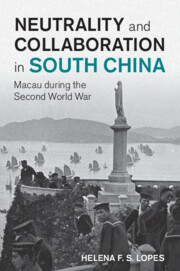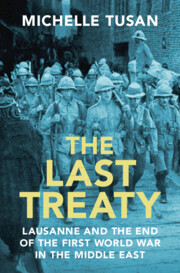Refine search
Actions for selected content:
15401 results in Military history
Additional material
-
- Book:
- The Last Treaty
- Published online:
- 01 June 2023
- Print publication:
- 15 June 2023, pp xvi-xx
-
- Chapter
- Export citation
Appendices
-
- Book:
- Neutrality and Collaboration in South China
- Published online:
- 01 June 2023
- Print publication:
- 15 June 2023, pp 281-282
-
- Chapter
- Export citation
1 - Caught in the Middle
-
- Book:
- Neutrality and Collaboration in South China
- Published online:
- 01 June 2023
- Print publication:
- 15 June 2023, pp 29-62
-
- Chapter
- Export citation
Contents
-
- Book:
- Neutrality and Collaboration in South China
- Published online:
- 01 June 2023
- Print publication:
- 15 June 2023, pp vii-vii
-
- Chapter
- Export citation
Acknowledgments
-
- Book:
- The Last Treaty
- Published online:
- 01 June 2023
- Print publication:
- 15 June 2023, pp x-xiii
-
- Chapter
- Export citation

Neutrality and Collaboration in South China
- Macau during the Second World War
-
- Published online:
- 01 June 2023
- Print publication:
- 15 June 2023

The Last Treaty
- Lausanne and the End of the First World War in the Middle East
-
- Published online:
- 01 June 2023
- Print publication:
- 15 June 2023
Part II - Institutions
-
- Book:
- Peacemaking and International Order after the First World War
- Published online:
- 18 May 2023
- Print publication:
- 01 June 2023, pp 177-286
-
- Chapter
- Export citation
Chapter 4 - Compliance and Defiance
- from Part I - Diplomacy and Politics
-
- Book:
- Vichy's Double Bind
- Published online:
- 18 May 2023
- Print publication:
- 01 June 2023, pp 77-97
-
- Chapter
- Export citation
Copyright page
-
- Book:
- Peacemaking and International Order after the First World War
- Published online:
- 18 May 2023
- Print publication:
- 01 June 2023, pp iv-iv
-
- Chapter
- Export citation
Part III - Actors and Networks
-
- Book:
- Peacemaking and International Order after the First World War
- Published online:
- 18 May 2023
- Print publication:
- 01 June 2023, pp 287-378
-
- Chapter
- Export citation
Chapter 5 - The Absence of Collaborationism
- from Part I - Diplomacy and Politics
-
- Book:
- Vichy's Double Bind
- Published online:
- 18 May 2023
- Print publication:
- 01 June 2023, pp 98-116
-
- Chapter
- Export citation
Chapter 2 - Pivoting between Alignments
- from Part I - Diplomacy and Politics
-
- Book:
- Vichy's Double Bind
- Published online:
- 18 May 2023
- Print publication:
- 01 June 2023, pp 32-51
-
- Chapter
- Export citation
Chapter 6 - The Menace Within
- from Part II - Local Encounters
-
- Book:
- Vichy's Double Bind
- Published online:
- 18 May 2023
- Print publication:
- 01 June 2023, pp 119-140
-
- Chapter
- Export citation
Part I - Ordering Concepts
-
- Book:
- Peacemaking and International Order after the First World War
- Published online:
- 18 May 2023
- Print publication:
- 01 June 2023, pp 35-176
-
- Chapter
- Export citation
Afterword
- from Part IV - Counterpoint
-
-
- Book:
- Peacemaking and International Order after the First World War
- Published online:
- 18 May 2023
- Print publication:
- 01 June 2023, pp 407-414
-
- Chapter
- Export citation
Conclusion
- from Part II - Local Encounters
-
- Book:
- Vichy's Double Bind
- Published online:
- 18 May 2023
- Print publication:
- 01 June 2023, pp 186-194
-
- Chapter
- Export citation
13 - An Alternative International Relations
- from Part III - Actors and Networks
-
-
- Book:
- Peacemaking and International Order after the First World War
- Published online:
- 18 May 2023
- Print publication:
- 01 June 2023, pp 313-336
-
- Chapter
- Export citation
Chapter 7 - Annexation by Stealth
- from Part II - Local Encounters
-
- Book:
- Vichy's Double Bind
- Published online:
- 18 May 2023
- Print publication:
- 01 June 2023, pp 141-159
-
- Chapter
- Export citation
1 - Introduction
-
-
- Book:
- Peacemaking and International Order after the First World War
- Published online:
- 18 May 2023
- Print publication:
- 01 June 2023, pp 1-34
-
- Chapter
- Export citation
